Here is the story that 9L0W’s Team offers to all MDXC Members. Our Club supported the DXpedition in Sierra Leone providing the official website, including added value internet visibility, online log-check and propagation tables services (courtesy of IK8LOV & DX-World).
We thank you so much all Team Members and we hope that MDXC support has been rise to the occasion.
Let’s read the story, directly from the pen of Karl DK2WV.
Sierra Leone, former British colony and protectorate (there was a bit of each), sits on the West African Atlantic coast between Guinea in the north and east, and Liberia in the south are neighbors. Mangrove swamps lie along the coast, with wooded hills and a plateau in the interior. The eastern region is mountainous.
The Bulom people were thought to have been the earliest inhabitants of Sierra Leone, followed by the Mende and Tenne peoples in the 15th century and thereafter the Fulani. The Portugese were the first Europeans to explore the land and gave Sierra Leone its name, which means “lions montains”. Freetown, on the coast, was ceded to English settlers in 1787 as a home for black discharged from the British armed forces and also for runaway slaves who had found asylum in London. In 1808 the coastal area became a British colony, and in1896 a British protectorate was proclaimed over the hinterland. Sierra Leone became an independent nation on April 27, 1961. In 1992 rebel solders overthrew the government. In 1996, another military coup ousted the country´s military leader and president.
Between 1991 and 2002 a civil war devastated the country leaving more than 50,000 people dead and much of the country’s infrastructured destroyed.
Despite valuable natural resources such as diamonds and bauxite it is extremely poor. It suffered severely from the atrocities of the long civil war which ended about 10 years ago. With some notable exceptions amateur radio activity has been relatively slight in recent years.
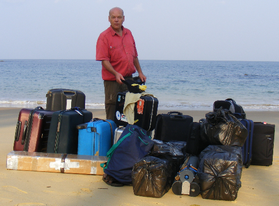 In June 2008 Karl DK2WV visited Freetown, the capital, and with great persistence managed to obtain a licence as 9L0W. He explored the possibility of mounting an expedition later in the year. Many locations were considered in order to find a site with electricity, water, acceptable accommodation and, of course, room for antennas with a reasonable take-off to major amateur radio activity. It was also hoped to activate the rare (for IOTA) Banana Islands (AF 037) which are close to the mainland about 25 km South of Freetown.
In June 2008 Karl DK2WV visited Freetown, the capital, and with great persistence managed to obtain a licence as 9L0W. He explored the possibility of mounting an expedition later in the year. Many locations were considered in order to find a site with electricity, water, acceptable accommodation and, of course, room for antennas with a reasonable take-off to major amateur radio activity. It was also hoped to activate the rare (for IOTA) Banana Islands (AF 037) which are close to the mainland about 25 km South of Freetown.
Karl recruited a team of amateurs with a great deal of Africa experience – both as residents and as licensed amateurs. He met the team in Friedrichshafen by the HAM-RADIO fare.
Monday morning, Nov 21, I had everything, including the travel documents and money , because in Sierra Leone credit cards or checks are almost unknown commodities. And so the trip could begin.
In Brussels , I met Jan DJ8NK and Heye DJ9RR which had arrived on time from Hamburg, Andy DL5CW and Andreas DL9USA who came from Berlin. Our rendezvous at Brussels Airport for the flight to Freetown via Banjul-Gambia seemed shorter because there was quite a bit to talk about. Then at last BOARDING was called , and off we went.
The flight via Banjul- Gambia – was a six hours flight for an intermediate landing, for about one hour, where most of passengers disembarked.
After a totally relaxed flight we landed on time in Sierra Leone. The airport Lungi is located on Peninsula opposite of the Capital of Freetown.
But what was awaiting us?
It was of course already pitch-dark. The first obstacles in the country are customs and immigration. You can hardly notice it, but obviously some money bills changed owner. Well, who knows how well or how badly people are paid here. In any case, they only wanted to look once into my case to see the technical equipment.
“What is this?”(Customs) – “It’s an Power Supply”- “Ah yes. And what is this?”.
The plug connector on top was enough, and I got the usual yellow cross. This meant, everything was OK.
We fought our way past (or donated) green stamps to a host of outstretched hands, some of them official.
The arrival at Lungi Airport brought those immediate West African experiences – air which is so humid you could bottle it and huge numbers of new friends – “Good friend, I carry very cheap”. In a word, chaos. But care is recommended, because the baggage can disappear faster than you can look.
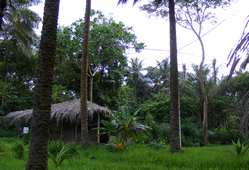 A small reception committee, consisting of Harry our host with Son Roland and our Cook Godwin awaited us.
A small reception committee, consisting of Harry our host with Son Roland and our Cook Godwin awaited us.
Harry was really a great help because he knew his way around and knew exactly, what had to be done. He organized our Toyota Bus for the trip to the ferry junction.
The airport being across a very wide deep water estuary from the capital. Crossing can be either by helicopter (quick, expensive but some recent fatalities), hovercraft (ex-Isle of Wight, medium speed, only one recent partial sinking)) and the ferry (ex-Greek islands, slow, relatively cheap but with strong safety warnings by the UK Foreign Office on safety grounds). Cheap seemed as good as any but it took 90 minutes to cross the estuary, entertained by an amazing on-board disco/cabaret act for the few passengers who had squeezed into the small “first class” lounge.
We had time enough because the ferry – which could also take cars – was at least an hour late. Roland had bought tickets for first class. First class meant that all baggage was stored in a large room, which looked like a shoebox with windows and doors. Here the baggage was kept in one corner, and the passengers could sit on long wooden benches.
The 2nd class passengers had to stay outside, which offered the advantage that the airstream offered them some cooling. Large loudspeakers were placed in the first class-shoebox, and a native, who considered himself a disc jockey, produced an ear-shattering noise. This in itself made it more pleasant to stay outdoors. Out there you could also find something to eat. Chicken, small fried pieces of meat on long metal skewers, bananas and pastry. The whole scenery was illuminated by strong spotlights, and you could clearly see spots of rust everywhere. Anyway, the ferry survived the trip to the other shore.
After threading through a very surprising Freetown traffic jam (at 10 pm!) the team bounced down the rough coast road to Kent the ship junction to the island.
As ever, the economy of Africa remains a mystery. At one level prices can be sky-high for tourists (far in excess of what might be thought a reasonable supplement for those from the affluent West). Often they can be reduced substantially by bartering but it is important to ensure you have something to barter with (i.e. an alternative!). In contrast, local village prices were so tiny it was hard to believe there was any point in having a shop. Even in Freetown taxis in Freetown charge rates which barely cover fuel costs. There are no cash machines in Sierra Leone with international connections and foreign exchange is often (illegally) obtained in the street. The most useful currency (in November 2011) was the Dollar and Euro. While we were happy to bring a substantial input to the local economy, we struggled when there was an assumption that we were millionaires – anyway, enough of world politics and economics.
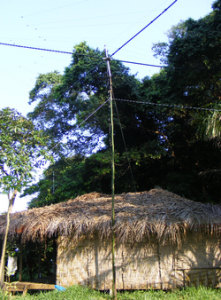 We decided to go during night to land on the island, because the sea was very quiet (low tide) and we saved one day more to be on the island and so we arrived our domicil at midnight. We quickly prepared our room and went to sleep.
We decided to go during night to land on the island, because the sea was very quiet (low tide) and we saved one day more to be on the island and so we arrived our domicil at midnight. We quickly prepared our room and went to sleep.
We stayed in a simple but clean hut – however, there was (generator) electricity and we each had a much-needed bed. Dawn broke to show that our guest house was well on the way to being finished – with quite a few people living round the huts. There was a fantastic view of white sands. We had a very warm welcome from our friends which put their house and compound at our disposal.
Godwin is an excellent cook, very hard working and always ready to help us.
He shows us his garden and explained which plants are on the island. In the smal village named Dublin one can find snacks such as fresh oranges, pineapple, or papaya, fried plantains, potato or cassava chunks with pepper sauce, small bags of popcorn or peanuts, bread, roasted corn, or skewers of grilled meat or shrimp.
Rice is the staple food of Sierra Leone and is consumed at virtually every meal daily. The rice is prepared numerous ways, and topped with a variety of sauces made from some of Sierra Leone’s favorite toppings, including potato leaves, cassava leaves, Crancran, hot peppers, peanuts, beans, okra sup, fish, beef, chicken, eggplant, onions, and tomatoes and chicken bones, which are a delicacy, because their brittle nature makes the sweet marrow inside easily accessible.
In the morning we drunk the delicious poyo the sweet, lightly fermented palm wine tapped from the high tops of palm trees.
Now time is coming to look around the area.
We set about getting antennas up – 2 Spiderbeams, ground plane for low bands, a HF9 vertical, a windom, Dipol for 60m and 160m and a four element for 6m. Rigs were two K3s, two K2s an IC7400 and three linears. The roof proved to be very useful for antennas and there were many helping hands. Power was provided by a 6KW Diesel generator.
We were soon on the air. Band conditions however, were wonderful. We were easily able to operate from different rooms without significant mutual interference using band-pass filters. It was always hot and humid – even in the middle of the night. We had no air-conditioning. Fortunately breezes from the sea served to keep mosquitoes at bay which was an unexpected bonus. From late morning until mid-afternoon the bands were usually poor and that gave an opportunity to go for a swim. The beach looks stunning and has some of the attributes of a tourist beach (e.g. access to cold Star beer) but, except for weekends, virtually no tourists.
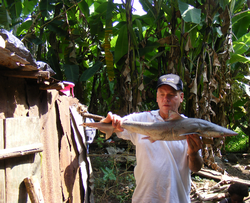 Our main fucus of this DX-pedition was to work every amateur radio operator who needs 9L and AF-037 for a new DXCC country or IOTA, including 6m and 5 MHz.
Our main fucus of this DX-pedition was to work every amateur radio operator who needs 9L and AF-037 for a new DXCC country or IOTA, including 6m and 5 MHz.
The two main islands are Dublin and Ricketts, about 5 miles end to end and linked together by a tidal causeway and a stone bridge. The islands were visited by the Portuguese in 1460 and there are still surprising European remains such as street lamps and a quite large church. There are no roads, cars or motorcycles. The 450 inhabitants are virtually all descendants of former slaves returned there after the abolition of slavery (as are the original inhabitants of Freetown).
The constant battle with insects and the overwhelming humidity added new dimensions to ham radio. However, the location did mean that the Spiderbeam low band vertical could be erected right next to the sea. It was also immediately apparent that AF-037 was greatly in demand and the Winlink connection forwarded many requests for low band activity in the first week later we had big trouble about our computers. The IARU beacons were still inaudible but gradually conditions began to improve and at last some stations were heard on top band.
On the third night when 60m seemed feasible, Karl was reconnecting the dipol, conditions did improve and a substantial number of 60m QSOs were logged – many “new ones”.
With just five operators, there was little rest and we did our best to match closed bands with times for sleep. During the first weekend DL5CW and DJ9RR worked on the contest – and the others moved to the WARC bands. Often it is said that there are few African stations active during a contest, but it is equally likely that some just can’t break through huge European signals with quite mundane calls who only want to run.
Was it worth it? Well we certainly enjoyed ourselves and hope that new band points or a new IOTA made it interesting for others around the world. We are especially grateful to the sponsors of the expedition: GDXF, microHam, NDXA-Nippon, Passau-DX-Club, SDXF, Mediteraneo DX Club, Spiderbeam and DL7AU.
What did we learn? Our equipment worked well. Beams and Poweramplifiers are helpful –and constantly to check monitor voltages.
Sierra Leone is a beautiful country which still faces huge challenges. We shall not forget the huge smiles and the daily greeting, “How de body?” (Answer: “De body fine”). Africa always shocks and surprises and the contrast between rich and poor is especially clear in Sierra Leone. To come and enjoy our hobby amid so many daily challenges made us feel almost guilty – but everyone seemed to enjoy having us around.
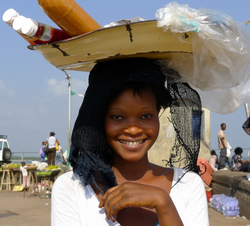
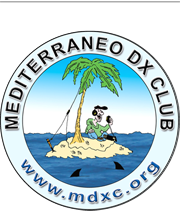

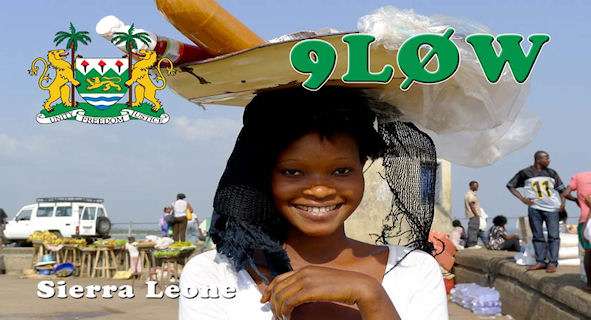
 TX7W Austral
TX7W Austral T32EU East Kiribati
T32EU East Kiribati


Dr. Wolfgang Heiser
einfach nur klasse!!!!
Danke
wolfgang
Comments are closed.